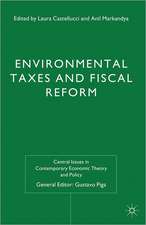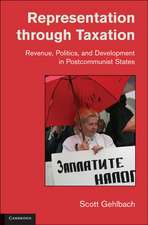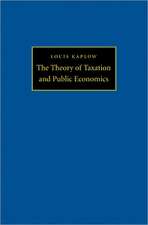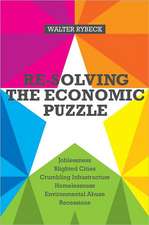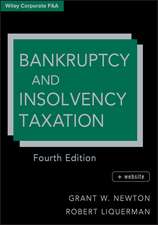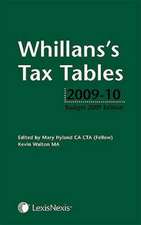Taxing Corporate Income in the 21st Century
Editat de Alan J. Auerbach, James R. Hines, Jr., Joel Slemroden Limba Engleză Paperback – 28 noi 2012
| Toate formatele și edițiile | Preț | Express |
|---|---|---|
| Paperback (1) | 344.97 lei 6-8 săpt. | |
| Cambridge University Press – 28 noi 2012 | 344.97 lei 6-8 săpt. | |
| Hardback (1) | 704.58 lei 6-8 săpt. | |
| Cambridge University Press – 15 apr 2007 | 704.58 lei 6-8 săpt. |
Preț: 344.97 lei
Nou
Puncte Express: 517
Preț estimativ în valută:
66.03€ • 71.75$ • 55.50£
66.03€ • 71.75$ • 55.50£
Carte tipărită la comandă
Livrare economică 22 aprilie-06 mai
Preluare comenzi: 021 569.72.76
Specificații
ISBN-13: 9781107411517
ISBN-10: 1107411513
Pagini: 424
Ilustrații: black & white illustrations
Dimensiuni: 152 x 229 x 24 mm
Greutate: 0.62 kg
Editura: Cambridge University Press
Colecția Cambridge University Press
Locul publicării:New York, United States
ISBN-10: 1107411513
Pagini: 424
Ilustrații: black & white illustrations
Dimensiuni: 152 x 229 x 24 mm
Greutate: 0.62 kg
Editura: Cambridge University Press
Colecția Cambridge University Press
Locul publicării:New York, United States
Cuprins
Contributors; Preface; 1. The effect of taxes on market responses to dividend announcements and payments: what can we learn from the 2003 dividend tax cut? Raj Chetty, Joseph Rosenberg and Emmanuel Saez; Comments Gustavo Grullon; Comments Douglas J. Skinner; 2. Dissecting dividend decisions: some clues about the effects of dividend taxation from recent UK reforms Stephen R. Bond, Michael P. Devereux and Alexander Klemm; Comments Roger Gordon; Comments James Poterba; 3. The 2003 dividend tax cuts and the value of the firm: an event study Alan J. Auerbach and Kevin A. Hassett; Comments William G. Gale; Comments George R. Zodrow; 4. How elastic is the corporate income tax base? Jonathan Gruber and Joshua Rauh; Comments Jane Gravelle; Comments Casey B. Mulligan; 5. An empirical examination of corporate tax noncompliance Michelle Hanlon, Lillian Mills and Joel Slemrod; Comments Joseph Bankman; Comments Brian Erard; 6. On the extent, growth, and efficiency consequences of state business tax planning Donald Bruce, John Deskins and William F. Fox; Comments William M. Gentry; Comments Charles E. McLure, Jr; 7. Corporate taxation and international competition James R. Hines Jr; Comments Jack M. Mintz; Comments John Douglas Wilson; 8. The changing role of auditors in corporate tax planning Edward L. Maydew and Douglas A. Shackelford; Comments Steven N. Kaplan; Comments Richard Sansing; 9. Taxation and the evolution of aggregate corporate ownership concentration Mihir A. Desai, Dhammika Dharmapala and Winnie Fung; Comments Jeffrey R. Brown; Comments Jeff Strnad; Index.
Recenzii
In this book most of the top stars of public finance economics grapple with a series of issues surrounding the taxation of corporate income. These include, among others, the reactions of corporations to changes in the corporate tax rate, tha reactions of the market to changes in the tax on dividends, and the efforts of corporations ( by choosing their location, by their debt-finance decisions, and by other means) to reduce their tax liabilities. The authors do not reach a clear consensus, but expose the reader to the many facets (of theory, of hypothesis framing and testing, and of data analysis) that turn out to be important as one delves into this topic. These matters are profound, rich and challenging to professionals interested in public finance and corporate behavior. -- Arnold C. Harberger, University of California, Los Angeles
The corporate income tax has a long history of analysis and consideration by economists, going back to Harberger's pathbreaking work in the 1960's. Yet questions of its efficiency costs and incidence remain controversial today and crucial to U.S. policy discussions of capital formation, competitiveness, and wages and income distribution. This volume collects important new papers on the consequences of the double taxation of dividends, corporate taxation of multinational firms, and links between corporate taxation and corporate governance. The book should be read both by economists interested in capital income taxation and by policy analysts piecing together the role of corporate taxation in tax reform. -- R. Glenn Hubbard, Dean, Columbia Business School
Understanding the effects of the corporate tax is one of the central and most difficult elements of tax policy. This book provides a comprehensive analysis of the issue. Auerbach, Hines, and Slemrod have brought together the leading researchers in the field, many of them using new or unique data sets to understand the effects of taxing corporations. The analyses will help further the debate on corporate tax compliance, international competition, the effects of dividend taxation, and many other issues of central importance to tax reform and to our economy. -- David Weisbach, The University of Chicago
Anyone interested in the issues related to taxing corporate income will find this book well worth their time to read. As highlighted in many of the discussant comments, as many if not more questions are raised than answered in many of the papers and I believe the book will prove to be fertile ground for graduate students and others searching for important and timely research questions. -- Terry Shevlin, University of Washington
The corporate income tax has a long history of analysis and consideration by economists, going back to Harberger's pathbreaking work in the 1960's. Yet questions of its efficiency costs and incidence remain controversial today and crucial to U.S. policy discussions of capital formation, competitiveness, and wages and income distribution. This volume collects important new papers on the consequences of the double taxation of dividends, corporate taxation of multinational firms, and links between corporate taxation and corporate governance. The book should be read both by economists interested in capital income taxation and by policy analysts piecing together the role of corporate taxation in tax reform. -- R. Glenn Hubbard, Dean, Columbia Business School
Understanding the effects of the corporate tax is one of the central and most difficult elements of tax policy. This book provides a comprehensive analysis of the issue. Auerbach, Hines, and Slemrod have brought together the leading researchers in the field, many of them using new or unique data sets to understand the effects of taxing corporations. The analyses will help further the debate on corporate tax compliance, international competition, the effects of dividend taxation, and many other issues of central importance to tax reform and to our economy. -- David Weisbach, The University of Chicago
Anyone interested in the issues related to taxing corporate income will find this book well worth their time to read. As highlighted in many of the discussant comments, as many if not more questions are raised than answered in many of the papers and I believe the book will prove to be fertile ground for graduate students and others searching for important and timely research questions. -- Terry Shevlin, University of Washington
Descriere
A state-of-the-art examination of the impact and wisdom of taxing corporate income, first published in 2007.




